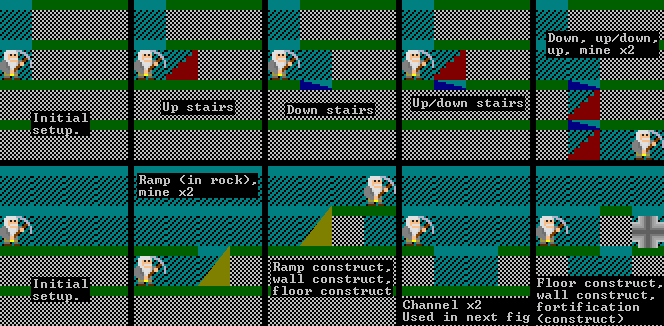- v50 information can now be added to pages in the main namespace. v0.47 information can still be found in the DF2014 namespace. See here for more details on the new versioning policy.
- Use this page to report any issues related to the migration.
Difference between revisions of "v0.34:Stairs"
(Included "Planning stairs" section from 40d, because it is so very helpful.) |
(→Planning stairs: Fixed some inconsistencies) |
||
| Line 25: | Line 25: | ||
* You can use the build menu ({{k|b}}{{k|C}}) to construct them in an open tile using material you have already gathered. | * You can use the build menu ({{k|b}}{{k|C}}) to construct them in an open tile using material you have already gathered. | ||
| − | However, a down or up stair will give you sufficient access to the adjacent level to build connecting stairs. This means you can dig directly downwards or even directly upwards using stairs without needing any other forms of access to the area | + | However, a down or up stair will give you sufficient access to the adjacent level to build connecting stairs. This means you can dig directly downwards or even directly upwards using stairs without needing any other forms of access to the area. |
| − | |||
| − | |||
You can't designate an up stair on a square that has already been dug out; you have to carve one out of an existing wall or {{k|b}}uild instead. You can then build the matching down stair on the level above. Furthermore, you can't designate a down or an up/down stair on the lowest level of the map. It is assumed that building an up or an up/down stair on the top level is equally difficult. | You can't designate an up stair on a square that has already been dug out; you have to carve one out of an existing wall or {{k|b}}uild instead. You can then build the matching down stair on the level above. Furthermore, you can't designate a down or an up/down stair on the lowest level of the map. It is assumed that building an up or an up/down stair on the top level is equally difficult. | ||
Revision as of 09:12, 13 July 2012
| This article is about an older version of DF. |
Stairs allow creatures to travel across z-levels. They can be dug out or constructed. They need to be connected to other stairs of the appropriate type to function. Up stairs need to be built below down stairs. Up/down stairs function as both up and down stairs at once.
Caravan Wagons can't travel across stairs -- you need ramps for those to be able to reach your trade depot.
Stairs do not block creature nor fluid movement. Falling creatures ignore stairs and may get seriously hurt if the real ground is several z-levels below them. Floor hatches can stop both falling creatures and liquid. They can also be locked to keep those pesky crundles from interrupting everything your dwarves could possibly do.
Stairs do not block falling objects. Falling objects dropped from above (i.e. a falling stone from a deconstructed floor) can injure a creature several z-levels below, doing really heavy damage.
Down stairs reveal a tile directly beneath them. If it's wet or warm, the designation on this tile will be removed.
As with all constructions, stairs can only be removed by dwarves (ordered to do so - never on their own initiative) or cave-ins. Dug out stairs can melt, if made from ice, but are otherwise just as resistant to damage.
Stairs are fully capable of holding any amount of weight above them. They are not as resistant to cave-ins as full walls, though; they won't stop falling cave-ins.
Planning stairs
Stairs can be created in two different ways, or a combination of them:
- You can use the designations menu (d) to carve them out of a wall of unmined material (see digging).
- You can use the build menu (bC) to construct them in an open tile using material you have already gathered.
However, a down or up stair will give you sufficient access to the adjacent level to build connecting stairs. This means you can dig directly downwards or even directly upwards using stairs without needing any other forms of access to the area.
You can't designate an up stair on a square that has already been dug out; you have to carve one out of an existing wall or build instead. You can then build the matching down stair on the level above. Furthermore, you can't designate a down or an up/down stair on the lowest level of the map. It is assumed that building an up or an up/down stair on the top level is equally difficult.
Bugs
Designating to build an up/down stair on top of a block with an item on it (such as a stone) and a down stair dug into the floor below it, may cause dwarves to constantly suspend spam. Verify?
| Rooms |
Barracks • Bedroom • Dining room • Dormitory • Jail • Meeting hall • Memorial hall • Hospital • Office • Sculpture garden • Tomb • Zoo |
|---|---|
| Furniture |
Animal trap • Anvil • Armor stand • Bed • Bin • Box • Bucket • Cabinet • Cage • Coffin • Restraint • Seat • Statue • Table • Weapon rack |
| Access | |
| Constructions | |
| Machine & Trap parts |
Axle • Gear assembly • Lever • Millstone • Pressure plate • Roller • Screw pump • Support • Trap • Water wheel • Windmill |
| Other Buildings | |
| Related Articles | |
